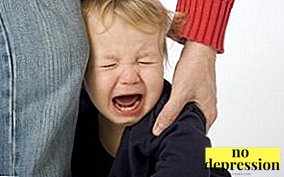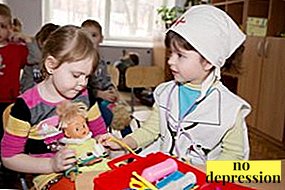Every parent has a moment in his life when he has to decide whether to take his child to kindergarten.
How many people, so many opinionstherefore, it is very difficult to find the right answer to the question regarding the necessity of kindergarten for a child.
You need to weigh the pros and cons before making decisions and come to a decision. Let's find out if a child needs kindergarten.
Should I give my baby to kindergarten?

In what situations you need to give the child to the garden, and in what you can do without a garden?
To give or not to give the child to kindergarten is the main question that worries most parents.
Now preschool education not required and it can be avoided at the request of the parents. Often, mom and dad face a difficult choice, they have to decide whether their child needs a kindergarten.
If both parents work and no one has the opportunity to sit with the child, and hiring a nanny is expensive, then the choice is obvious. Kindergarten in this case is life buoy.
Of course, in preschool the child is under the constant supervision of professionals, learns how to live according to the regime, learns new things and subsequently prepares for school.
And most importantly - child adapts to society, learns to interact with people of different characters and work in a group, communicate with peers and adults, in the future it will be much easier for him to get used to the team.

If mom has opportunity and desire to educate the childthen in this case, it can not be given to kindergarten.
But it is worth remembering that this is a big responsibility and hard work.
At home the child much harder to concentrate. Also, the kid may not go to kindergarten if he is hired by a nanny and tutors for his training.
Now there are many special centers and studios for children in which they are taught and engaged with them.
The advantage of such centers is that the child still gets to the team at an early age, but he does not need to spend the whole day there, eat and sleep. He comes only to classes.
There are also special children's camps and activities.
Advantages and disadvantages of DOW
Does a child need to go to kindergarten? Only parents decide to walk or not to attend kindergarten. it not mandatory as a school.

Therefore, if there is a choice, then you can weigh all the advantages and disadvantages of visiting a kindergarten and decide what will be best for the child.
Cons kindergarten:
- Stressful situation for the baby. The period of adaptation to kindergarten is very difficult for the child. He cries a lot, makes tantrums and worries. Without his mother, with whom he was used to spending his entire day, he feels vulnerable and unprotected. In order to develop and achieve something, a child must always feel the sincere support of loved ones, faith in him, love and understanding.
And preschool teachers, however good they are, cannot provide this for every child.
- There is a type of children who very quickly emotionally and psychologically depleted, they need time to be alone and to do things they are interested in. And in kindergarten to do this will not work.
- Poor peer influence. In groups there are different children from different families. And of course, there may be those who, with their bad behavior, will set an example to other children.
- The child begins to get sick often. Usually, children are led to the garden by those parents who work a lot and cannot take sick leave all the time. Therefore, if their child coughs or sneezes, they will still take him to the kindergarten. Educators accept all children who have no temperature. Thus, healthy kids catch the virus.
- All experts and many parents argue that the main advantage of visiting a kindergarten is that children learn to communicate with each other. They are among their peers, and this helps them in socialization. But is it? On the one hand, yes, from the age of 3, the child already needs to communicate with other children, and not be surrounded only by their loved ones. What do parents do in this case? Take him to kindergarten. But there, the child usually sees a strange pattern of behavior and the norms of communication can often frighten him. It happens that there are up to 20 people in groups, and the teacher is one and it is physically difficult for him to organize all the children.
Therefore, sometimes stronger children begin to oppress those children who are weaker. They can take away toys, push, shove and mock, and sometimes even hit.
There are also guys who sneer on others and cuddle up to their caregivers.

Advantages of kindergarten:
- Mode. In kindergarten, the child learns the regime and the daily routine. After all, waking up and going to bed, eating and walking at the same time is very useful for the body. But not all adults adhere to the regime.
- Discipline. In kindergarten, children teach elementary rules of behavior and teach them to comply. A child learns to behave properly at the table during meals, in the classroom, during games with children, etc. Discipline gives the child the ability to behave properly in society.
- Independence. In the kindergarten, there are no relatives near the child who are ready to help in any situation. No one else feeds him with a spoon, does not tie his shoelaces and does not lull him to sleep.
In the kindergarten, the child, like other children, learns to be independent and perform the actions that a person of his age must perform.
- Communication with adults. Before the child is in kindergarten, he knows only one reputable adult - his parents. But getting into kindergarten, he meets with teachers, nannies and other adults working in preschool. He understands that you need to listen not only to mom, but also to other adults. Not only mom can teach something, explain something and help with something. This experience will be useful before the kid goes to grade 1 and gets acquainted with his first teacher.
- In kindergarten, the child receives intellectual development. The first lessons and classes are held here.
 He first learns to count, sculpt and draw, to exercise, to distinguish colors and geometric shapes. In preschool institutions there is a training program, which is followed by all educators. Each age group has different activities and exercises with which children must cope. In private kindergartens, the program is usually much better than in state ones, but there are also good state kindergartens in which the kids will be very interesting and informative.
He first learns to count, sculpt and draw, to exercise, to distinguish colors and geometric shapes. In preschool institutions there is a training program, which is followed by all educators. Each age group has different activities and exercises with which children must cope. In private kindergartens, the program is usually much better than in state ones, but there are also good state kindergartens in which the kids will be very interesting and informative. - Communication with peers. In kindergartens, children first encounter with the team. As a rule, in each team there is a quiet, a teaser, an asshole, a rebel, etc. It has already been said earlier that this point can be attributed not only to pluses, but also to minuses. Now consider it from the positive side.
In the kindergarten, the kid learns to join the team, to be part of it, to find a common language with different types of people, to express themselves, etc. In the kindergarten there are many team games that will help to acquire certain social skills.
The child learns to solve conflicts that have arisen, and parents and caregivers should help him in difficult situations. As a rule, such experience can be gained only in a preschool institution, communication at playgrounds under the supervision of parents will not be enough. And this experience will be a plus for further school life.

Opinion of psychologists

Should I give the child to kindergarten? Surprisingly psychologists advise not to send the child to kindergarten rather than to give.
Some people think, regarding socialization, not the correct opinion that a kindergarten helps children to better adapt to society.
Getting into the team at such an early age, a child loses his individuality and inheriting others, it becomes “like everything”.
Most psychologists believe that up to 6 years old, the child needs to strengthen the relationship with his family and loved ones as much as possible, because 11 years ahead of school will be waiting for him and communication with relatives will not be so frequent.
Answering the question “Does a child need a kindergarten?”, Most psychologists will answer that only parents decide.
If there is no special need for a preschool institution, there is an opportunity to get an education at home, then it is worth giving preference to the second option.
You just need to visit more often, so that the children can communicate with each other go to circles and sections, perhaps in some children's centers and so on.
If adaptation is difficult for a child, he does not want to go to the garden, and parents have the opportunity to stay at home with him, then there is no need to torture the baby. It will not lead to anything good.
Consequences of not attending kindergarten

What if a child does not go to kindergarten?
How does it affect it?
It used to be that if a child did not go to kindergarten, then he will be harder to adapt to life, improve relationships in school, etc.
But now you can refute these stereotypes. Education in preschool does not always carry in itself only positive. First, it all depends on the child.
If he himself is calm and not very sociable, no kindergarten him will not help to become talkative.
Secondly, if the parents have the opportunity to give the child the same thing as the kindergarten, but only at homethen you should consider this option. Perhaps it is even better.
The main thing is to work with the child, to teach him so that he can do everything that the children of his age can do. Giving him more to communicate with peers and adults, this is important.
Lack of kindergarten in the life of a child will not affect it negatively. It is not an obligatory step in development. All that is given in the garden, you can get at home.
Especially in our time, when there are a variety of development centers, children's rooms, sections and events. Mommies can give a child everything he needs, the main desire.

So does a child need a kindergarten? It is difficult to answer this question unequivocally.
Each parent, teacher and psychological your opinion on this.
It is important to know what the child wants and what he needs in one or another period of his life. If there is an opportunity not to go to kindergarten, then why not use it?
The main thing that it was not at the expense of the development of the baby. We need to take care of his education and socialization.
Should a child be sent to kindergarten? Opinion psychologist:

 He first learns to count, sculpt and draw, to exercise, to distinguish colors and geometric shapes. In preschool institutions there is a training program, which is followed by all educators. Each age group has different activities and exercises with which children must cope. In private kindergartens, the program is usually much better than in state ones, but there are also good state kindergartens in which the kids will be very interesting and informative.
He first learns to count, sculpt and draw, to exercise, to distinguish colors and geometric shapes. In preschool institutions there is a training program, which is followed by all educators. Each age group has different activities and exercises with which children must cope. In private kindergartens, the program is usually much better than in state ones, but there are also good state kindergartens in which the kids will be very interesting and informative.

